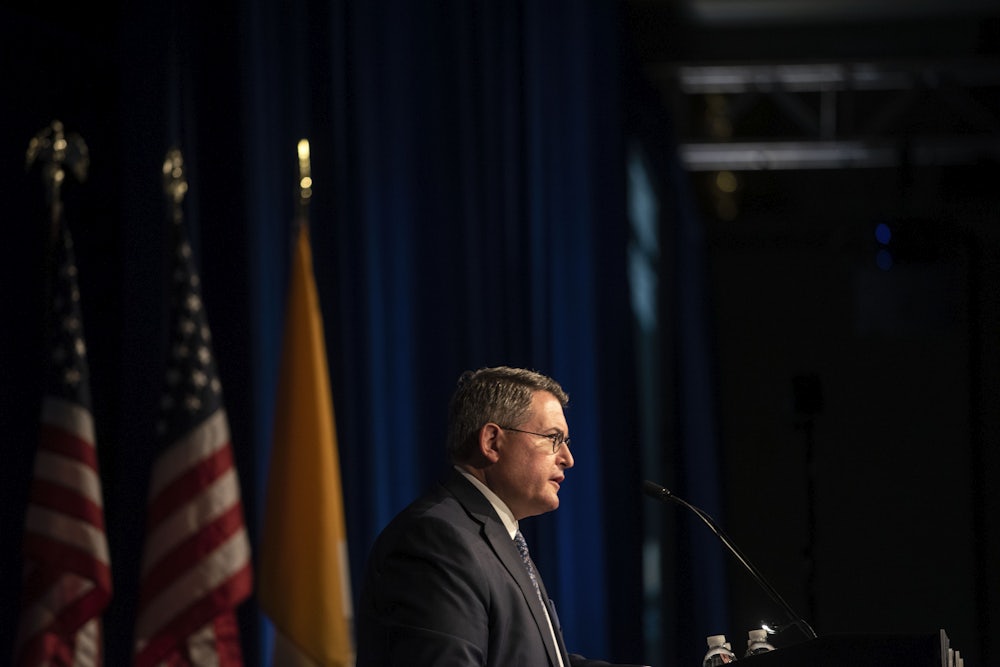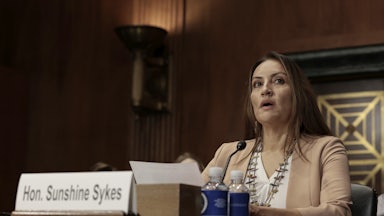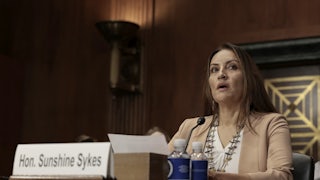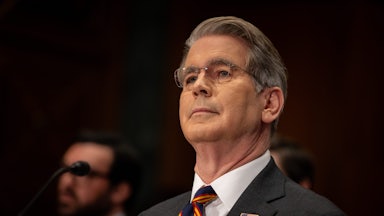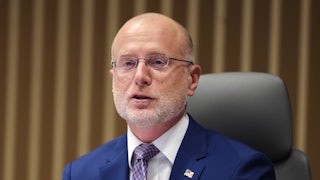Leonard Leo, the éminence grise of the conservative legal movement, said on Tuesday that he won’t cooperate with the Senate Judiciary Committee’s ethics investigation into some members of the Supreme Court. In a seven-page letter sent by his lawyers, he claimed the committee’s attempt to learn more about his interactions with some of the court’s conservative members “infringes two provisions of the Bill of Rights.”
The investigation, Leo claimed, amounted to “political retaliation” against him and the conservative justices, which violated his free speech rights. He and his lawyers asserted that he is “entitled by the First Amendment to engage in public advocacy, associate with others who share his views, and express opinions on important matters of public concern.” While that is undoubtedly true in the broad sense, it is strange to see him describe his interactions with Supreme Court justices as engaging in public advocacy and associating with those who share his views.
“For similar reasons, your inquiry cannot be reconciled with the Equal Protection component of the Due Process Clause of the Fifth Amendment,” he continued. Leo argued that he was being singled out for a “politically based difference in treatment” compared to other individuals who had given trips and gifts to various justices over the years. He described Senate Democrats’ rhetoric toward him over the years as “disparate treatment” and said it violated the Constitution’s equal-protection provisions.
Most importantly, however, Leo also cast doubt on whether Congress had any power to enact ethics reforms for the Supreme Court. “And regardless of its other constitutional infirmities, it appears that your investigation lacks a valid legislative purpose, because the legislation the Committee is considering would be unconstitutional if enacted,” he told the senators. Since he believed the court did not have that power, Leo said he was not obligated to cooperate.
His stonewalling underscores the degree to which Congress’s investigatory powers over the other branches of government have been curtailed by Trump v. Mazars, a 2020 ruling by the Supreme Court. The case involved a series of subpoenas issued by House committees to obtain former President Donald Trump’s financial records for various investigations. Lower courts had sided with lawmakers on their validity, but the justices concluded that they should give more deference to the presidency.
“When Congress seeks information ‘needed for intelligent legislative action,’ it ‘unquestionably’ remains ‘the duty of all citizens to cooperate,’” Chief Justice John Roberts wrote for a 7–2 majority, quoting from precedent. “Congressional subpoenas for information from the President, however, implicate special concerns regarding the separation of powers. The courts below did not take adequate account of those concerns.” Leo and others have contended that those concerns also apply to Congress’s interactions with the Supreme Court, and by extension to him.
Congress’s investigatory powers are as old as the republic itself. Naturally, not all of these inquiries went unchallenged: When the Senate tried to learn more about the drafting of the Jay Treaty, George Washington invoked (and thereby established) executive privilege to refuse to hand over the papers. But the baseline assumption was that Congress had broad investigatory powers and that they were vital for the business of drafting legislation and carrying out public policy goals.
Courts repeatedly upheld that position over the last two centuries. In the 1927 case McGrain v. Daughtery, for example, the justices unanimously ruled that Congress could compel witnesses to testify before it as part of its inquiry into the Teapot Dome scandal. Even when it upheld privileges against testifying before Congress in some circumstances, the Supreme Court recognized that this was only an exception to the general rule.
“There can be no doubt as to the power of Congress, by itself or through its committees, to investigate matters and conditions relating to contemplated legislation,” Chief Justice Earl Warren wrote in the 1955 case Quinn v. United States. “This power, deeply rooted in American and English institutions, is indeed coextensive with the power to legislate. Without the power to investigate—including, of course, the authority to compel testimony, either through its own processes or through judicial trial—Congress could be seriously handicapped in its efforts to exercise its constitutional function wisely and effectively.”
Warren also noted some obvious exceptions. In Quinn, which involved a witness called before the House Un-American Activities Committee, he noted that the Fifth Amendment privilege against self-incrimination always applied. Nor can Congress usurp the executive branch’s law enforcement powers. Finally, he wrote, the power to investigate “cannot be used to inquire into private affairs unrelated to a valid legislative purpose.”
Roberts, Warren’s eventual successor as chief justice, elevated that last exception in Mazars. He noted that at oral argument, the legislative branch declined to identify a limit to what amount to a “valid legislative purpose.” That led him to assume the worst. “Any personal paper possessed by a president could potentially ‘relate to’ a conceivable subject of legislation, for Congress has broad legislative powers that touch a vast number of subjects,” he wrote.
After acknowledging that Congress historically had those “broad legislative powers,” however, Roberts then sought to justify limiting them with worst-case scenarios. “Without limits on its subpoena powers, Congress could ‘exert an imperious controul’ [sic] over the Executive Branch and aggrandize itself at the President’s expense, just as the Framers feared,” he wrote, quoting from the Federalist Papers. “And a limitless subpoena power would transform the established practice of the political branches. Instead of negotiating over information requests, Congress could simply walk away from the bargaining table and compel compliance in court.”
To that end, he laid out a four-part test for courts to use when weighing congressional subpoenas against the presidency. They are not meant to be used sequentially, so I will describe them slightly out of order. The first part of the test instructed courts to determine “if other sources could reasonably provide Congress the information it needs in light of its particular legislative objective.” The second part required courts to ensure that the subpoena must be “no broader than reasonably necessary to support Congress’s legislative objective.” And the fourth part urged courts to “carefully scrutinize” the “burdens” imposed by such a subpoena upon the presidency by a “rival” branch so they do not consume too much of a president’s “time and attention.”
It is the third part, however, that got the most attention: The courts, Roberts wrote, “should be attentive to the nature of the evidence offered by Congress to establish that a subpoena advances a valid legislative purpose.” (Roberts also suggested there may be more parts to this test in the future but left that decision to future cases.) He advised the courts to pay particular attention to whether the stated purpose was clear and detailed enough. “That is particularly true when Congress contemplates legislation that raises sensitive constitutional issues, such as legislation concerning the presidency,” he noted.
Mazars’ new test has already obstructed important congressional work. In perhaps the most famous episode so far, multiple witnesses invoked the “valid legislative purpose” prong to resist subpoenas by the House January 6 committee. The litigation allowed key figures like former Trump adviser Steve Bannon and Mark Meadows, the former White House chief of staff, to delay compliance in hopes of running out the clock before the next election. Even when they prevailed, committee members had to spend limited time and energy laying out a painstaking rationale for each subpoena for the courts to draw upon for a matter where Congress’s investigative power should be indisputable.
In his letter to the committee, Leo also took issue with how the bill’s particular mechanics for addressing recusal by Supreme Court justices would work. But he also cast doubt on its constitutionality in broader terms. “More generally, any attempt by Congress to enact ethics standards for the Supreme Court would falter on constitutional objections,” he wrote. “There is no enumerated power in Article I of the Constitution that authorizes Congress to regulate the inner workings of the Supreme Court. Ethics standards imposed by Congress on the Supreme Court would therefore necessarily be unconstitutional.”
For one thing, Leo’s assertion that Congress has no power to regulate “the inner workings” of the court is not as clear-cut as he makes it sound. After all, Congress has enacted laws that decide how many justices amount to a quorum, when their annual term begins and ends, and who serves as chief justice during a vacancy or incapacity. Like every other federal employee, the justices are already bound by certain financial-disclosure laws, so the claim that Congress has no power whatsoever in this context is one that’s been conceded by the court for decades.
The Mazars test, if applied in Leo’s case, would also effectively require the courts to decide the constitutionality of proposed legislation before Congress can enact it. If the Senate opted to formally subpoena Leo, he would then argue that any proposed legislation Congress could enact on the matter would be unconstitutional. If he is correct, then the subpoena fails under Mazars. If he is incorrect, then the subpoena can go forward under Mazars. How can the lower courts apply Mazars without deciding whether prospective legislation is constitutional?
This is not how things are supposed to work. As Schoolhouse Rock taught millions of American schoolchildren over the years, a bill does not become a law until it is approved by both the House and the Senate and then signed by the president. One of the most important checks on judicial power is Article III’s command that the courts only hear “cases and controversies.” They can only give relief for injured parties; they can’t issue advisory opinions on what the law could be or should be, only what it is. The Senate Judiciary Committee’s bill is currently just that: a bill.
Ironically, only one justice said that Congress had no right to issue the Mazars subpoenas at all. Justice Clarence Thomas opined that Congress could only issue subpoenas that raised separation of powers questions as part of the impeachment process, effectively requiring lawmakers to put the cart before the horse when it comes to their investigations. (Justice Samuel Alito also dissented but did not go that far, instead arguing for an even more stringent test.) If Thomas had prevailed, he and Leo would be even further beyond lawmakers’ scrutiny—and that of the American public.
